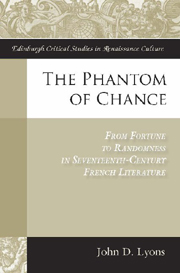Book contents
- Frontmatter
- Contents
- Preface: The Phantom of Chance
- Acknowledgements
- Series Editor's Preface
- Introduction
- 1 Fortune, Mistress of Events: Corneille and the Poetics of Tragedy
- 2 God in a World of Chance: Pascal's Pensées and Provincial Letters
- 3 From Chance Events to Implausible Actions: Lafayette and the Novel
- 4 The God of Suspense: Bossuet's Providential History and Racine's Athalie
- 5 An Accidental World: La Bruyère's Characters
- Conclusion
- Bibliography
- Index
Introduction
Published online by Cambridge University Press: 12 September 2012
- Frontmatter
- Contents
- Preface: The Phantom of Chance
- Acknowledgements
- Series Editor's Preface
- Introduction
- 1 Fortune, Mistress of Events: Corneille and the Poetics of Tragedy
- 2 God in a World of Chance: Pascal's Pensées and Provincial Letters
- 3 From Chance Events to Implausible Actions: Lafayette and the Novel
- 4 The God of Suspense: Bossuet's Providential History and Racine's Athalie
- 5 An Accidental World: La Bruyère's Characters
- Conclusion
- Bibliography
- Index
Summary
The Tradition of Chance
Whether or not chance exists, there are certainly many words in European languages that belong to a conceptual cluster denoting contingency, to things without necessity. Aristotle writes of tyche and automaton in the Poetics, in the Physics and in the Nicomachean Ethics. Latin developed its own vocabulary for chance, unrelated to Aristotle's terms: casus appears alongside fortuna and is sometimes distinguished from it. A set of concentric circles widen away from chance or tyche, and there we can find words that are occasionally quasi-synonyms for ‘by chance’, like ‘arbitrary’ or ‘random’ or ‘coincidence’ and so forth. Tyche appears in most modern English translations as ‘chance’ and in recent French translations as hasard, in German as Zufall, in Italian and Spanish as caso. Each of these terms requires attention in context because they often convey shades of meaning and even direct opposition. And then there is a host of terms that seem to be antonyms and to be completely irreconcilable with ‘chance’, such as ‘Providence’ or even ‘fate’, but things in ordinary life are more complicated. We need only recall that Aristotle, in banishing chance from the denouement of the successful tragedy, also banished the intervention of the gods, the deus ex machina, thus suggesting that claims of divine intervention could be, on some occasions, placed into the same category as chance.
- Type
- Chapter
- Information
- The Phantom of ChanceFrom Fortune to Randomness in Seventeenth-Century French Literature, pp. 1 - 29Publisher: Edinburgh University PressPrint publication year: 2011



